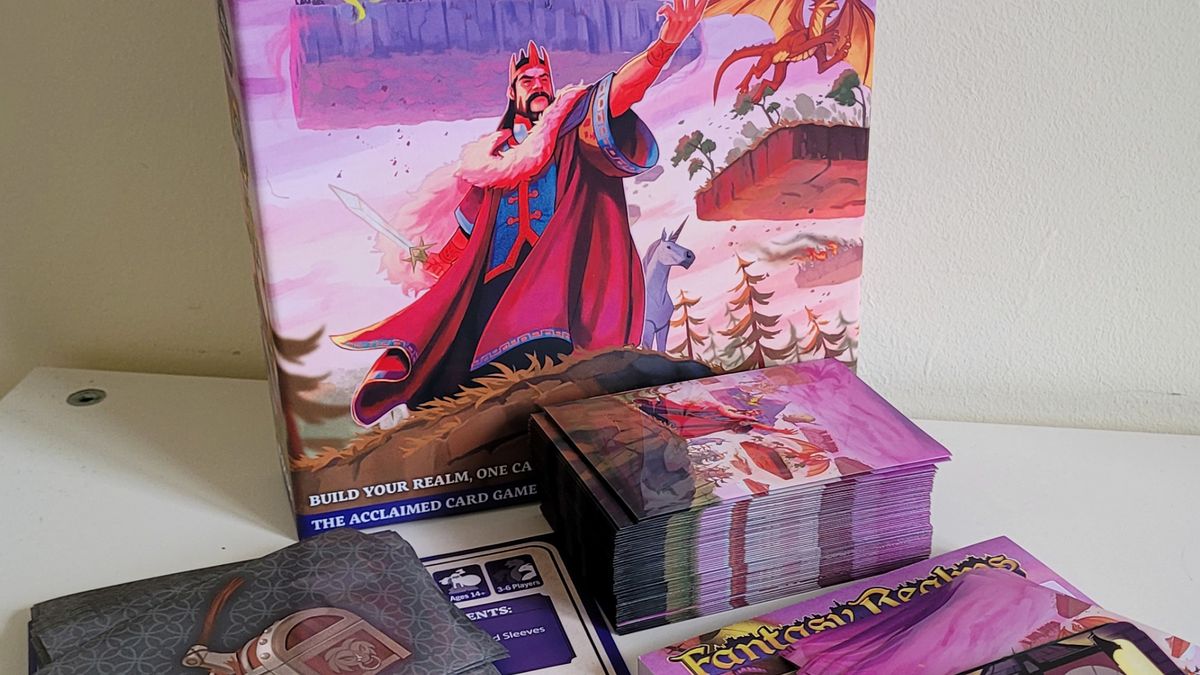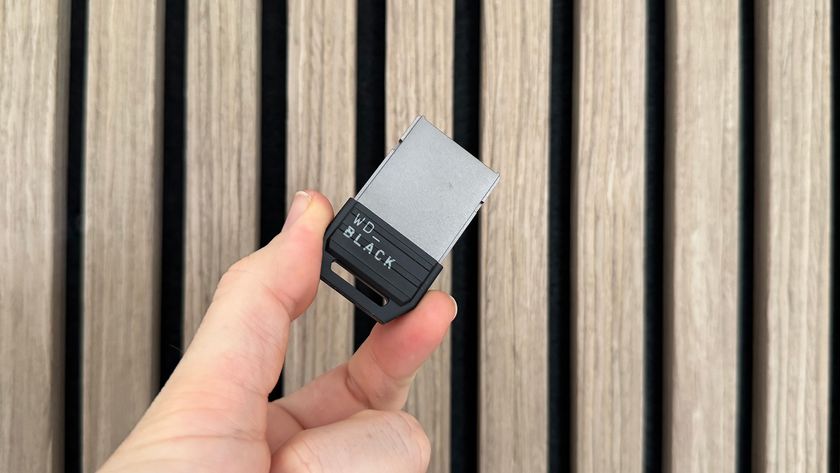12DOVE Verdict
On paper, Fantasy Realms Deluxe shouldn't work as well as it does - it's lacking in strategy and depth. But thanks to strangely addictive gameplay, it defies the odds to become something of a classic.
Pros
- +
Short, simple, and strangely addictive
- +
Very wide appeal, working as well with gamers as with families
- +
Good production values for a small box card game with bright art and sleeves
Cons
- -
Requires constant adding up with each new card
- -
Doesn’t offer much in the way of ongoing strategy
- -
Included expansion content is only so-so
Why you can trust 12DOVE
Fantasy Realms originally came out in 2017 and caused quite a stir. The designer, Bruce Glassco, was only really known to the world for Betrayal at House on the Hill some 13 years previously. That was a highly thematic, semi-cooperative horror board game with a lot of moving parts and chaos. This new design, by contrast, was a semi-abstract, family-friendly game of set collection with clear mathematical bones. But it proved popular and was nominated for the Kennerspiel des Jahres, one of tabletop gaming’s biggest prizes. Now it’s back in a new, improved Deluxe edition... but should you bother grabbing it, particularly if you can find the original for less? And is it worthy of standing shoulder to shoulder with the best card games?
Fantasy Realms Deluxe - features
| Price | $34.99 / $29.99 |
| Ages | 14+ |
| Players | 2 - 6 |
| Lasts | 20 mins |
| Complexity | Moderate |
Although it doesn't change any mechanics from the original Fantasy Realms, this Deluxe version sets itself apart by including all-new artwork and an overhauled visual style. It features the 'Cursed Hoard' expansion pack as well, along with card sleeves to protect the components.
Fantasy Realms Deluxe - how does it work?
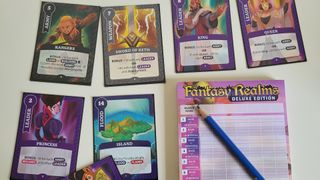
- Cards have a base points value which is modified by the cards in your hand
- You take a face-up or face-down card before discarding one face-up
- The Cursed Hoard expansion adds cards with special powers for a points penalty
Fantasy Realms has one of the simplest rulesets you’ll find in a hobby-grade card game. You start with a hand of seven cards. On your turn, you pick one more, either blind off the top of the deck or from a selection of face-up cards that have been discarded. Then you discard one, face-up, to the pool where anyone can pick it up on a following turn if they desire. The game ends when there are ten such face-up cards and everyone tots up their score.
It’s in the scoring that the intricacies of the game lie, although there’s still nothing complex to handle rules-wise. Every card has a basic value printed in the top left but most of the time its real value comes from bonus - or sometimes penalty - points that it gains from its interactions with other cards you hold. The magic wand, for instance, is worth a measly single point unless you’ve also got a card in the wizard suit, in which case it gains a bonus of 25 points. The water elemental is worth four points, meanwhile, but it gets a tasty 15 extra points for each other card you hold that belongs to the flood suit.
These are simple examples, representative of the majority of the cards. But some of them are far more unusual or more complex. The doppelganger, an example of the former, copies everything but the bonus of another card. For the latter, you’ve got things like the great flood which essentially forces you to ignore all cards of several suits except the lightning card.
Weirdly, the box lists the game as requiring three to six players, but the original played fine with two - and so does this
While the rules themselves are very simple, when you consider you’ve got seven cards and each card can be modified by all of the other six, the interactions can become quite complex.
Included in the box are two promo cards and a reprint of the Cursed Hoard expansion for the original. This adds three new suits which you can add to the base game if desired, alongside a deck of 'cursed' items. Each player has one until played, at which point they draw a replacement. They give you a special power and a points penalty commensurate with that power. The crystal lens only penalises you two points and it lets you peek at the top card before deciding where you’re going to draw from. The mighty wishing ring, by contrast, lets you put any card you want atop the deck, even before you draw… but costs a whopping thirty points off your score.
Weirdly, the box lists the game as requiring three to six players, but the original played fine with two - and so does this. There’s even a two-player variant listed in the rules and the game actually works better at lower player counts, so quite why there’s a three-player minimum on the box side is a bit of a mystery. It may be because the two-player version is tighter if you leave out the expansion material and stick to the base game.
Fantasy Realms Deluxe - gameplay
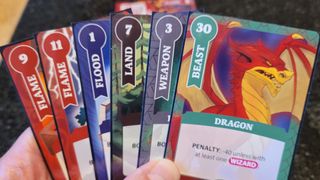
- Reassessing your hand each turn is a satisfying and addictive puzzle
- With practice, you can learn to make better discard and pickup choices
- The play is very fast but lacks depth
Your first task, with a fresh hand of seven cards, is to work out which of them is worth keeping based on their interactions with each other. This takes a while and can delay the first draw. Each must be examined, its suit and bonus checked, and the other cards fanned through to see if any effect that bonus score. You need to do this with each card in turn and then think about whether there are any multiple interactions in your hand or any combos that you’re close to fulfilling.
This feels like a bit of a pain. It’s also a gateway drug into what turns out to be a weirdly addictive experience.
While working over all the possible combos is a nuisance, it’s also strangely satisfying. You don’t have to go into calculating the numbers at this point - although it can help your strike rate if you do - so it doesn’t take too long to do the tally. You then have to re-do it each time you draw a card. It’s an almost perfect mental load for light gameplay, interesting enough to keep you engaged but nowhere near tough enough to stop you from having a chat and a laugh with your opponents.
Fantasy Realms, frankly, shouldn’t be as fun as it is... But it’s one of those titles that defy the laws of ludic gravity and punches above its weight
Fishing for cards also contributes to the addictive qualities of Fantasy Realms and the game knows it. There’s a reason why you get a fat bonus for having both the King and the Queen or an even fatter bonus for collecting the Shield and the Sword of Keth. Drawing blind is like pulling the balls at bingo as you wait to see if what you’ll get completes a set or is useless chaff. All the players will soon be circling the face-up discards like a pack of vultures. Once you get to know the deck, there’s also a modicum of strategy in watching what other players are collecting so you can try and avoid discarding what they’re collecting.
That modicum of strategy, however, is pretty much all the strategy there is in the game. Your focus here is far more on solving the little tactical puzzle of your hand, reassessing the numbers with each new opportunity. The trade-off for this lack of depth is the speed with which the game is learned and played. You can complete a hand in 15 minutes, some of which will be the drag factor of totting up scores at the end. But the lure of the puzzle is such that it’s very tempting to jump right back in and go again, applying what you’ve learned from the last session and hoping for better luck.
After a few such iterations you’ll no doubt be tempted to try some of the expansion content. This is a pretty mixed bag. The extra suits add some complex and interesting new interactions to enjoy. But you play with bigger hands and more discards when using the extra suits which extends that short, sweet play time and they dilute the chance of combos from the original deck. The cursed items are very chaotic which can be fun but, often, the payoff isn’t worth the penalty and they make an already light game even lighter.
Should you buy Fantasy Realms Deluxe?
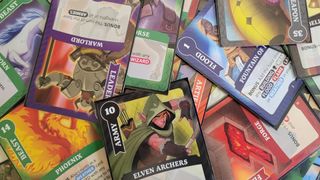
Fantasy Realms, frankly, shouldn’t be as fun as it is given the lack of strategy and moving parts. But it’s one of those titles that defy the laws of ludic gravity and punches above its weight in terms of what it gives you for your time. In fact, it’s been popular enough to spawn two spinoffs, the superhero-themed Marvel Remix and Star Trek: Missions for sci-fi fans. This is partly down to its wide appeal, with only die-hard fans of heavier fare and kids who don’t want to do any more adding after school being immune to its charms. While you don’t strictly need the expansions and card sleeves in this deluxe edition, it’s still the definitive version of a minor classic.
Buy it if...
You could use a fast, fun, filler card game
You like the idea of solving small, constantly shifting puzzles
You like quick feedback loops
Don't buy it if...
You dislike the idea of math in your games, even if it's fairly simple
You want to focus on deeper, heavier, or more thematic affairs
For more recommendations, check out the best board games, these essential board games for adults, and must-have board games for 2 players.
More info
| Genre | Fantasy |
Matt is a freelance writer specialising in board games and tabletop. With over a decade of reviews under his belt, he has racked up credits including IGN, Dicebreaker, T3, and The Guardian.

After nearly 23 years, Grand Theft Auto: Vice City follows in GTA 3's footsteps and is finally playable on the Sega Dreamcast

The Hunger Games director's new horror movie based on a Stephen King novel sets 2025 release date
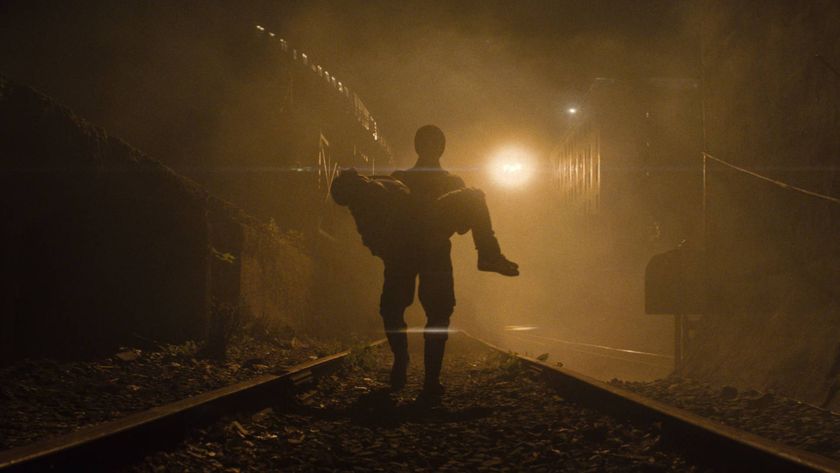
A wild Marvel theory teases how Daredevil: Born Again could bring back its big villain in season 2
